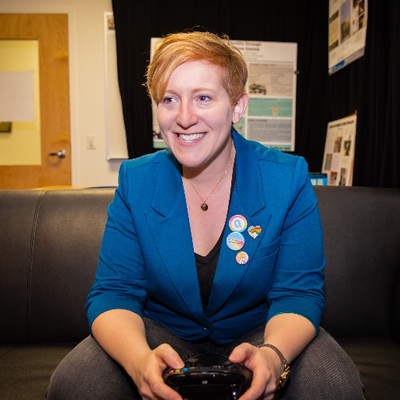Here are some of the resources I have developed for myself as a teacher, as well as for my students, my colleagues, and those who contact me with an interest in my fields. Feel free to use them, share them, and adapt them as works for you.
Why share resources? It’s not just pragmatic; it’s political. Sharing resources is a crucial part of supporting one another as feminists, queer folks, and others who are so often marginalized. Especially in academic and industry environments that push us to compete, collaboration is key. By building knowledge together, we resist the narrative that we are separate, niche, small, or minor.
“Queer Game Studies 101: An Introduction to the Field” (UPDATED March, 2018)
Queer game studies is a fast-emerging academic field that explores the intersection of LGBTQ issues, games, and play. Some folks who are new to this field don’t realize that a wealth of writing has been published on queerness and games. This handy list offers a crash course in queer games studies, with a list of recommended readings, queer games to play, and additional resources, like conference talks and LGBTQ games archives. It’s also a great resource for teachers working on syllabuses.
“Getting a Ph.D. in Game Studies: A Guide for Aspiring Game Scholars” (UPDATED March, 2018)
Game studies is an exciting field, and more and more I hear from students who are interested in going to grad school to get their Ph.D. in games. For an aspiring game studies scholar, however, the path forward isn’t as clear as for scholars in other disciplines. This guide explains some of the big decisions aspiring game studies scholars need to make — and offers a list of universities where students can Ph.D.s related to games.
“They/Them Pronoun Info Sheet” (PDF)
This helpful, friendly info sheet is designed to promote inclusivity in workplaces and other communities. It’s especially oriented toward cis colleagues who want to support people of all genders but who don’t know a lot about pronouns. The info sheet was created in collaboration with peers and students who use they/them pronouns. One of our goals in writing it was to take some of the burden of educating faculty off of students by giving their teachers a resource for self-education.
Office door sign for supporting marginalized students (PDF)
After the 2016 presidential election, I found myself feeling powerless — and yet, I also felt I needed to do something, however small, to show my students that I supported them at this deeply upsetting and worrying time. This sign expresses my commitment to students of color, Muslim students, queer students, students with disabilities, undocumented students, and others as I work to build a supportive space where they can thrive. It now hangs on my door and the doors of many of my colleagues.
“How to (Actually) Be an Ally at GDC”
This piece is oriented toward developers and students who attend video game industry events, but it’s also relevant for participants at all kinds of professional events. I’ve attended GDC — the Game Developers Conference — since 2006, and in that time I’ve seen a lot of folks who consider themselves allies nonetheless promote discrimination against others. These six handy tips can help you (or those around you) succeed at making professional spaces less hostile and more inclusive.

